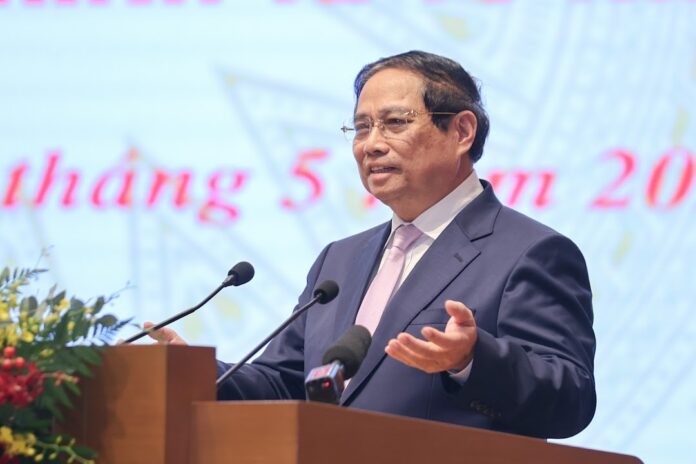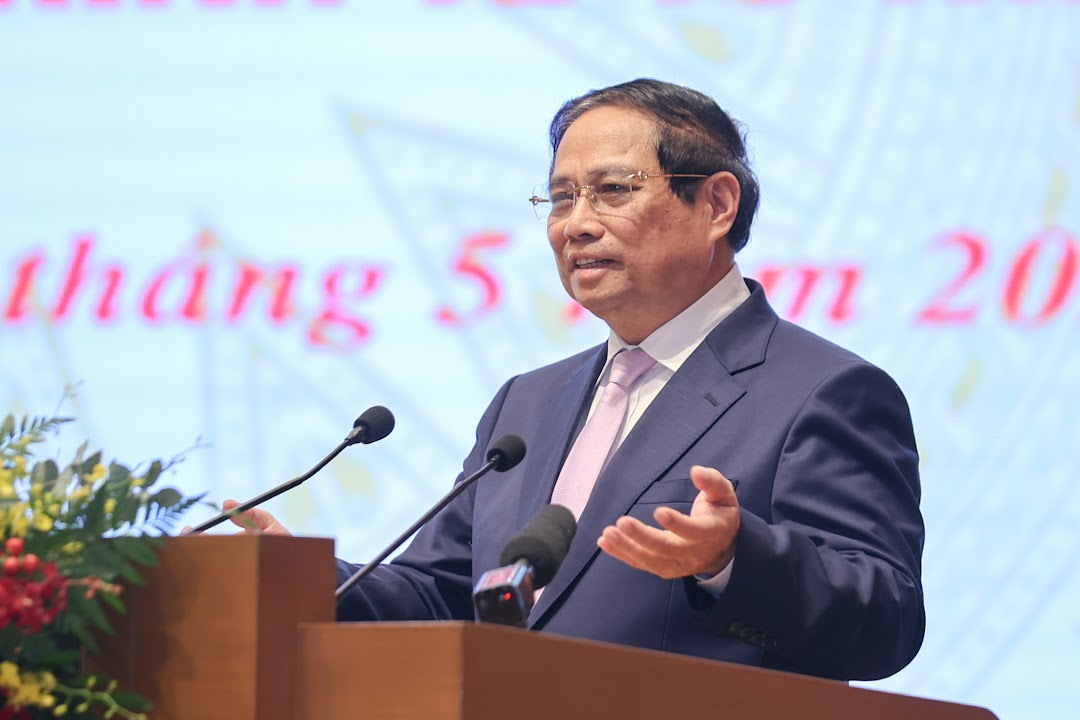
Prime Minister delivers a speech at a workshop with enterprises and enterprise associations to effectively implement the Politburo’s Resolution 68 on private sector development. Photo: VGP
On the morning of May 31 in Hanoi, Prime Minister Pham Minh Chinh chaired a workshop with enterprises and enterprise associations to effectively implement Resolution 68-NQ/TW of the Politburo on private sector development. Notably, during the discussion, representatives of enterprise and enterprise association leaders made proposals and recommendations.
Among them was a sharing from Mr. Nguyen Trung Chinh, Chairman of the Board of Directors of CMC Technology Group Joint Stock Company. Specifically, the businessman said that Resolution 68 of the Politburo on private economic development has fundamentally resolved the problems and obstacles that need to be removed for enterprises.
“We have heard about the Government’s constructive efforts, and now I believe that entrepreneurs and enterprises need to have a spirit of co-construction and development with the Government. The proactiveness of enterprises and entrepreneurs is very important. Enterprises and entrepreneurs are the subjects of change and
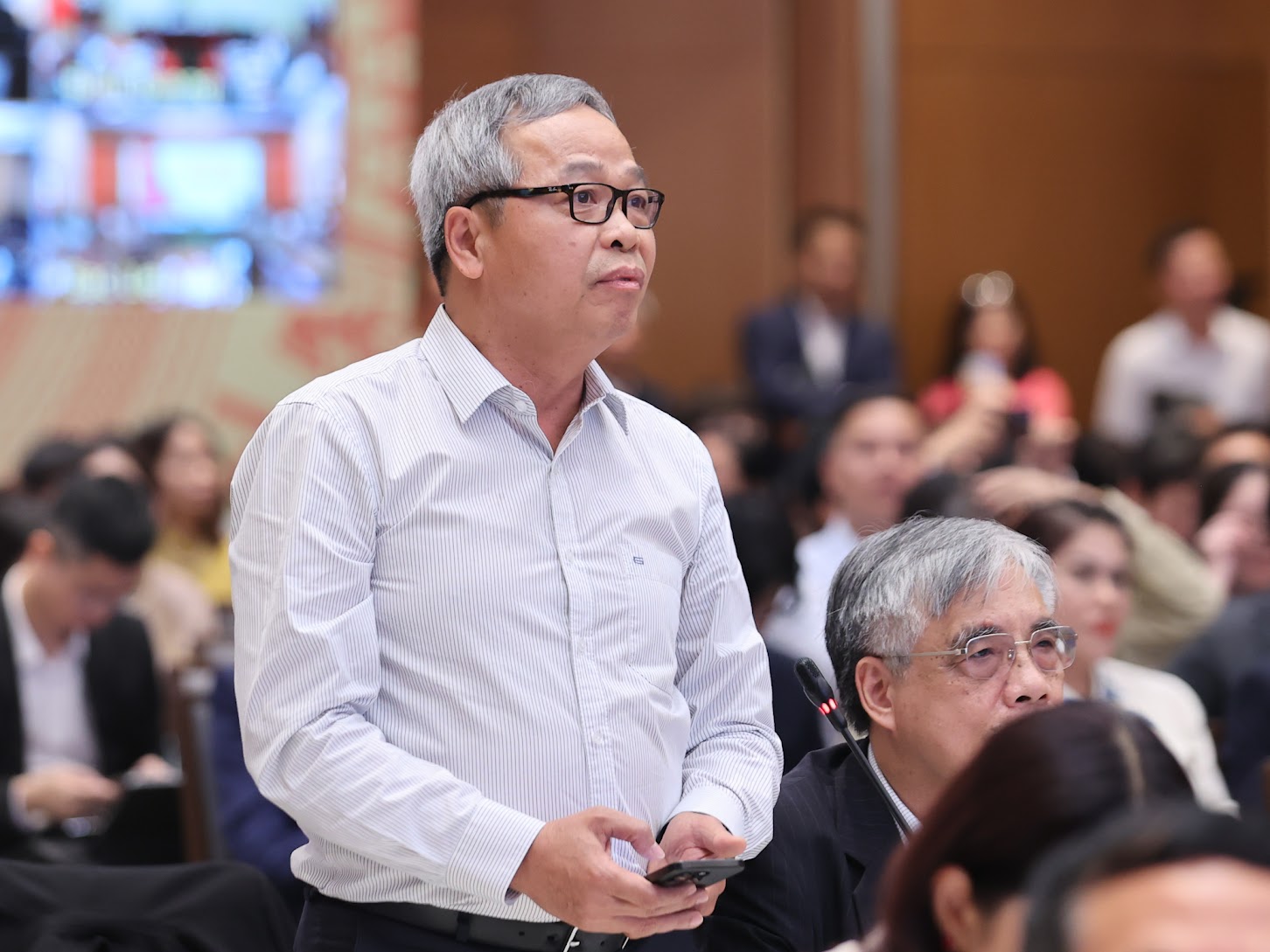
Mr. Nguyen Trung Chinh, Chairman of the Board of Directors of CMC Technology Group Joint Stock Company, hopes to have the opportunity to participate in national infrastructure projects. Photo: VGP
According to him, at present, when enterprises propose to remove difficulties in their operations, they are still doing so individually. If we shift from individual proposals to making proposals through associations to the Government and local authorities to jointly build mechanisms and policies to remove obstacles, it will be more effective.”
Resolution 68-NQ/TW sets an important target of reducing administrative procedures by 30%. Mr. Nguyen Trung Chinh believes that enterprises and entrepreneurs need to actively and proactively contribute to the review of the percentage reduction in procedures. He said that it is time for enterprises to proactively participate in the co-construction process. For example, in construction, there is a new regulation that if there is already a 1/500 plan, there is no reason to apply for a construction permit.
“I would also like to propose that we receive the trust of the Government to have the opportunity to participate in national infrastructure projects, such as digital infrastructure and transportation infrastructure. For the high-speed railway project, I believe that large enterprises in Vietnam such as Hoa Phat, Vingroup, Thaco, and our technology enterprises are capable of participating and have the capacity to undertake such projects”, said the Chairman of the Board of Directors of CMC Technology Group Joint Stock Company.
He said that domestic enterprises can cooperate to implement large projects that are currently being carried out by foreign contractors.
Private sector contributes 50% of Vietnam’s GDP. What needs to change?
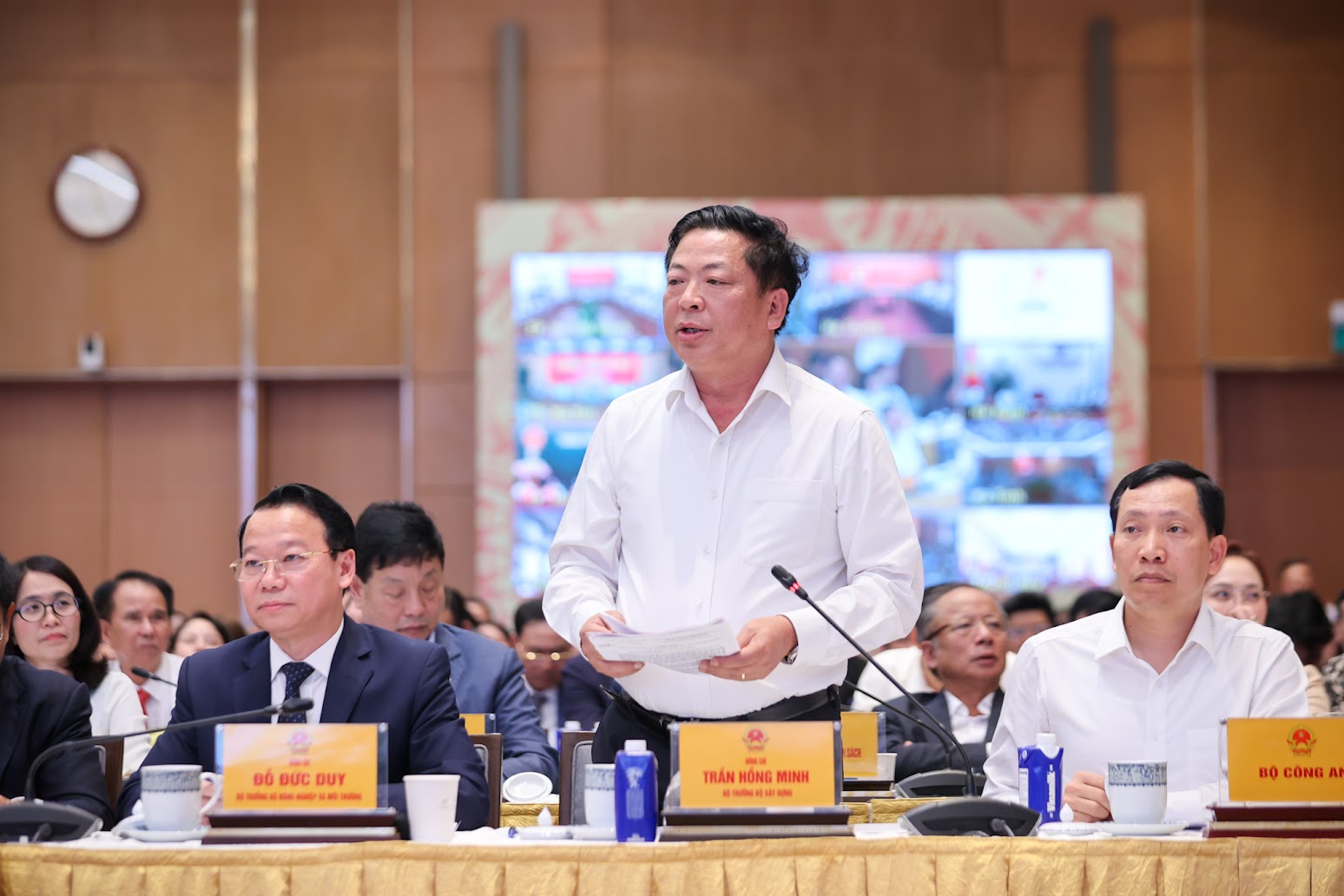
Minister of Construction Tran Hong Minh speaks at the workshop. Photo: VGP
At the workshop, Minister of Construction Tran Hong Minh said that Vietnam currently has nearly 1 million enterprises, with the private sector contributing 50% of GDP and about 30% of total state budget revenue, employing 80% of the labor force. This can be considered a significant contribution from the private sector in the past time.
To effectively implement Resolution 68/NQ-TW of the Politburo, in the coming time, we need to develop 2 million enterprises and achieve a growth rate of 10-12%; at the same time, achieve the goals of digital transformation, innovation, and development of science and technology, aiming to rank 3rd in ASEAN and 5th in Asia.
Following the direction of the Government and the Prime Minister, the Ministry of Construction has implemented 13 laws, more than 30 decrees, and more than 100 circulars to reform administrative procedures in the fields of construction, aviation, railways, waterways, and transportation, linking private sector development to the Law. First of all, promote decentralization from the central to local governments; localities will be responsible for their work.
Second is to reduce administrative procedures and eliminate unnecessary investment and business conditions in all fields of construction, aviation, railways, waterways, and transportation, and participate in laws with other ministries and sectors such as the Law on Bidding and the Law on Investment. For example, the feasibility study report, construction design, implementation of the basic design, reduction in the number of certificates of capacity, and simplification of construction trades…
According to the Minister of Construction, as of May 4, 2025, the Ministry has cut 134/417 business conditions and 128/361 administrative procedures, achieving 31%. Currently, according to the plan, Step 2 is being completed, and the Ministry of Construction continues to strive to achieve the target of reducing 50% of administrative procedures.
Regarding the goal of promoting the internal resources of the private sector – the field of public investment in the form of PPP, in the period from 2026 – 2030, Vietnam will implement 26 expressways equivalent to VND 5,242,000 billion, and the current form is public investment. However, the Ministry of Construction proposed to the Government to allow enterprises to participate in the form of PPP to reduce the burden on the state budget.
For the project of 12 national railway lines and 23 urban railway lines in Ho Chi Minh City and Hanoi with a value of about VND 5,087,000 billion in the period from now to 2035, the Ministry of Construction also hopes for investment in the form of PPP, public-private.
Investing in ports and waterways costs VND 104,000 billion. For inland waterways, the authority has been delegated to localities with a value of about VND 27,000 billion. Upgrading the runways of airports costs about VND 23,000 billion, and they have been decentralized to localities. The Minister of Construction hopes that all enterprises will focus on the field of PPP investment in combination with public-private investment.
Regarding the proposal that localities need to meet with enterprises every six months to listen to their opinions, the Minister of Construction said that not only localities but also ministries must participate to listen to the opinions of enterprises.
Regarding the real estate investment process, it is necessary to simplify the procedures. In addition, for the opinion on the construction sector, it should be oriented towards a composite unit price instead of an independent unit price. For bidding, we need to research, synthesize, and analyze further.
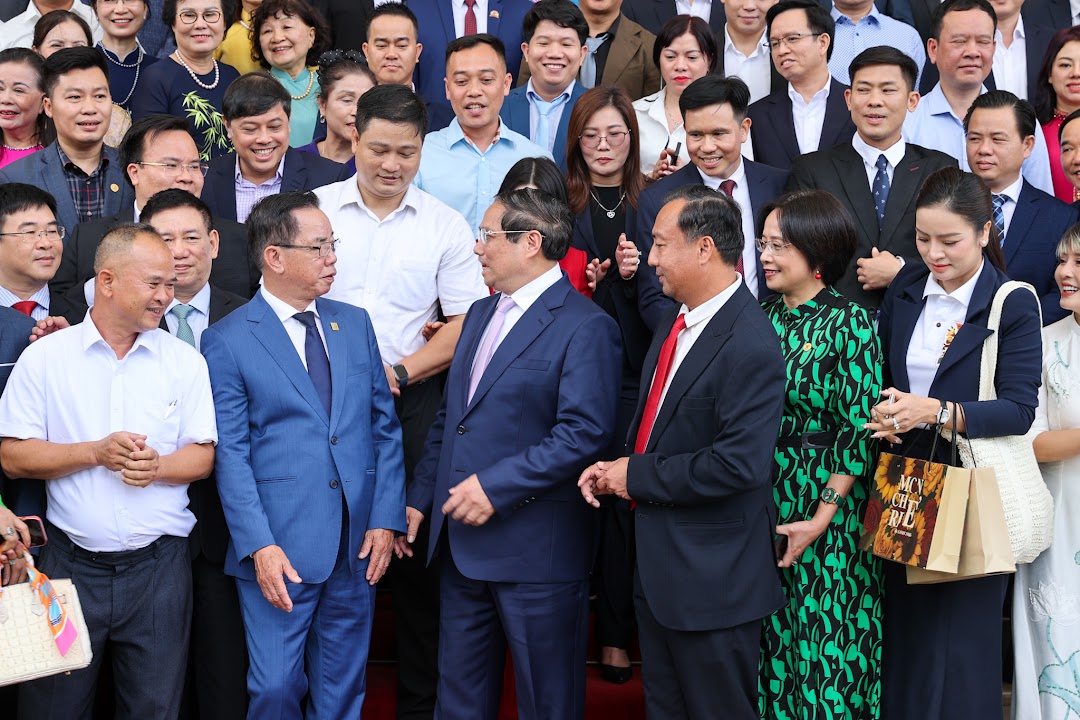
The Prime Minister exchanges with enterprises after the workshop. Photo: VGP
Concluding the workshop, the Prime Minister emphasized six contents regarding the expectations for enterprises and entrepreneurs. Notably, the Prime Minister emphasized that enterprises and entrepreneurs should continuously innovate, research, and apply science and technology, digital transformation, smart governance, especially the transfer of core and source technology, enterprises must take the lead, pioneer, and be proactive in this field to bring benefits to the nation.
In addition, according to the Prime Minister, enterprises and entrepreneurs, together with the Government, ministries, and sectors under the leadership of the Party and the management of the State, participate in co-construction and development, contribute to institution building, infrastructure development, and high-quality human resource training, contributing to the construction and protection of the country towards “stable and sustainable development, sustainable development, sustainable future”, and the people’s happiness and prosperity.
Regarding the responsibility of the Government, ministries, sectors, and leaders of localities, the head of the Government requested to regularly meet and exchange with enterprises to find solutions to difficulties and problems. In fact, the Government and the Prime Minister have regularly and proactively met with enterprises. Since the beginning of 2025, there have been at least three meetings to discuss the development of Resolution 68, remove difficulties, and respond to new policies.
Proposing to meet quarterly, the Prime Minister requested that ministries, sectors, and localities also do the same, meeting with enterprises regularly and periodically to remove difficulties and obstacles in the sectors they manage. Along with that, it is necessary to promote the role of the National Legal Portal, which has just been inaugurated.
Especially, the Prime Minister requested to resolve the requirements, difficulties, and proposals of enterprises within two weeks.
The workshop on enterprises and enterprise associations to effectively implement Resolution 68-NQ/TW of the Politburo on private sector development was attended by more than 1,000 delegates representing enterprises, enterprise associations, business households, and cooperatives… to listen to contributions, proposals, and recommendations on policies, tasks, and solutions for private sector development in the coming time, thereby affirming the position and role of the private sector, making an important contribution to the rapid and sustainable socio-economic development.
When Vietnam Entered the Top 25 Largest Economies in the World
“Mr. Michael Kokalari, Head of Macroeconomic and Market Research at VinaCapital, asserts that the core vision of Resolution 68 on private economic development is to foster a rapidly growing, sustainable, high-quality, and globally competitive private sector. The UK-based independent economic forecasting center estimates that Vietnam will join the ranks of the world’s 25 largest economies by 2039.”
Tax Reform: Ensuring Equity and Efficiency for Private Sector Growth
“To effectively implement Resolution 68-NQ/TW on private economic development, the Ministry of Finance is dedicated to harmonizing tax and fee policies towards fairness, efficiency, and sustainability. A comprehensive overhaul of pivotal tax laws is currently underway. Moving forward, close collaboration between government ministries and the business community will be instrumental in translating these policies into tangible outcomes.”

